Ready to FALL into some new books this autumn? (*wink*) Get your TBR ready for every book from Tor coming out this fall! Which one are you most excited to read?
September 6
opens in a new window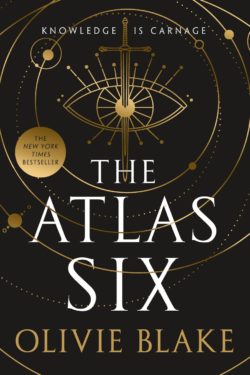 The Atlas Six by Olivie Blake (paperback)
The Atlas Six by Olivie Blake (paperback)
Each decade, only the six most uniquely talented magicians are selected to earn a place in the Alexandrian Society, the foremost secret society in the world. The chosen will secure a life of power and prestige beyond their wildest dreams. But at what cost? Each of the six newest recruits has their reasons for accepting the Society’s elusive invitation. Even if it means growing closer than they could have imagined to their most dangerous enemies—or risking unforgivable betrayal from their most trusted allies—they will fight tooth and nail for the right to join the ranks of the Alexandrians. Even if it means they won’t all survive the year. Now available in paperback!
September 20
opens in a new window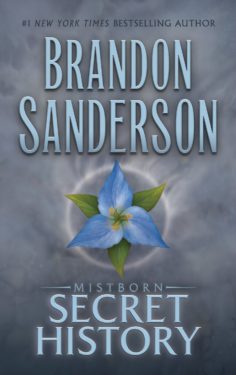 Mistborn: Secret History by Brandon Sanderson
Mistborn: Secret History by Brandon Sanderson
Kelsier, sentenced to die mining the Pits of Hathsin after attempting to rob the Lord Ruler’s palace, arose as a powerful Mistborn and inspired the revolution that shook the foundations of the Final Empire. His name and deeds passed into legend. But was that truly the end of his tale? Whispered hints to those he called friends suggested there was a lot more going on. If you think you know the story of the Mistborn trilogy, think again—but to say anything more here risks revealing too much. Even knowing of this tale’s existence could be heresy.
September 27
opens in a new window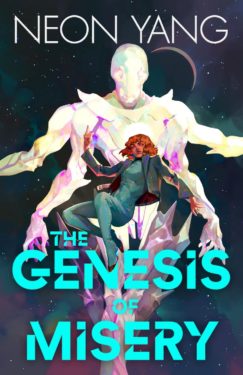 The Genesis of Misery by Neon Yang
The Genesis of Misery by Neon Yang
It’s an old, familiar story: a young person hears the voice of an angel saying they have been chosen as a warrior to lead their people to victory in a holy war. But Misery Nomaki (she/they) knows they are a fraud. Raised on a remote moon colony, they don’t believe in any kind of god. Their angel is a delusion, brought on by hereditary space exposure. Yet their survival banks on mastering the holy mech they are supposedly destined for, and convincing the Emperor of the Faithful that they are the real deal. The deeper they get into their charade, however, the more they start to doubt their convictions. What if this, all of it, is real?
opens in a new window Growing Up Weightless by John M. Ford; introduction by Francis Spufford
Growing Up Weightless by John M. Ford; introduction by Francis Spufford
Matthias Ronay has grown up in the low gravity and great glass citadels of independent Luna—and in the considerable shadow of his father, a member of the council that governs Luna’s increasingly complex society. But Matt feels weighed down on the world where he was born, where there is no more need for exploration, for innovation, for radical ideas—and where his every movement can be tracked by his father on the infonets. Matt and five of his friends, equally brilliant and restless, have planned a secret adventure. Their passage into the expanse of perpetual night will change them in ways they never could have predicted…and bring Matt to the destiny for which he has yearned. With a new introduction by Francis Spufford, author of Red Plenty and Golden Hill.
October 4
opens in a new window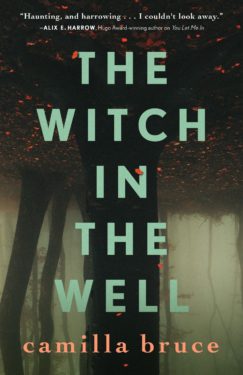 The Witch in the Well by Camilla Bruce
The Witch in the Well by Camilla Bruce
Centuries ago, beautiful young Ilsbeth Clark was accused of witchcraft after several children disappeared. Her acquittal did nothing to stop her fellow townsfolk from drowning her in the well where the missing children were last seen. When author and social media influencer Elena returns to the summer paradise of her youth to get her family’s manor house ready to sell, the last thing she expected was connecting with—and feeling inspired to write about—Ilsbeth’s infamous spirit. The very historical figure that her ex-childhood friend, Cathy, has been diligently researching and writing about for years. What begins as a fiercely competitive sense of ownership over Ilsbeth and her story soon turns both women’s worlds into something more haunted and dangerous than they could ever imagine.
October 11
opens in a new window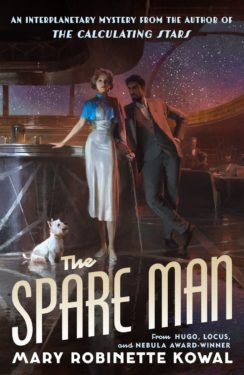 The Spare Man by Mary Robinette Kowal
The Spare Man by Mary Robinette Kowal
Tesla Crane, a brilliant inventor and an heiress, is on her honeymoon on an interplanetary space liner, cruising between the Moon and Mars. She’s traveling incognito and is reveling in her anonymity. Then someone is murdered and the festering chowderheads who run security have the audacity to arrest her spouse. Armed with banter, martinis and her small service dog, Tesla is determined to solve the crime so that the newlyweds can get back to canoodling—and keep the real killer from striking again.
opens in a new window Mystic Skies by Jason Denzel
Mystic Skies by Jason Denzel
Fifty-four years have passed since Crow Tallin, the catastrophic celestial event that merged Fayün and the human world. One devastating result of that cataclysm is that most human babies are born fused with fay spirits. The Mystics of Kelt Apar, once beloved, are blamed for this worldwide phenomenon. On the island of Moth, the Barons have declared the Myst illegal and imprisoned all Mystics under house arrest. Under the watchful eyes of deadly Hunters, a much-older Pomella AnDone now lives as a prisoner at Kelt Apar with her granddaughter and apprentice Mia, as well as the rapidly declining High Mystic of Moth, Yarina Sineese.
October 25
opens in a new window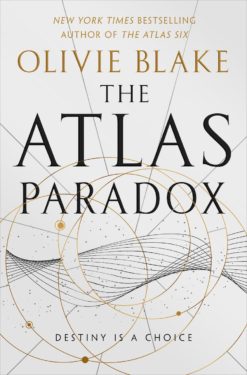 The Atlas Paradox by Olivie Blake
The Atlas Paradox by Olivie Blake
Six magicians were presented with the opportunity of a lifetime. Five are now members of the Society. Two paths lay before them. All must pick a side. Alliances will be tested, hearts will be broken, and The Society of Alexandrians will be revealed for what it is: a secret society with raw, world-changing power, headed by a man whose plans to change life as we know it are already under way.
November 1
opens in a new window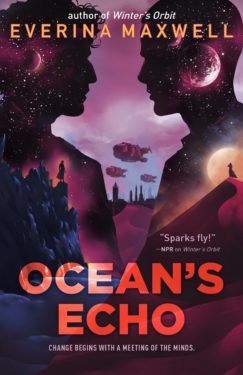 Ocean’s Echo by Everina Maxwell
Ocean’s Echo by Everina Maxwell
Rich socialite, inveterate flirt, and walking disaster Tennalhin Halkana can read minds. Tennal, like all neuromodified “readers,” is a security threat on his own. But when controlled, readers are a rare asset. Not only can they read minds, but they can navigate chaotic space, the maelstroms surrounding the gateway to the wider universe. Conscripted into the military under dubious circumstances, Tennal is placed into the care of Lieutenant Surit Yeni, a duty-bound soldier, principled leader, and the son of a notorious traitor general. Whereas Tennal can read minds, Surit can influence them. Surit accepted a suspicious promotion-track request out of desperation, but he refuses to go through with his illegal orders to sync and control an unconsenting Tennal. So they lie: They fake a sync bond and plan Tennal’s escape.
November 8
opens in a new window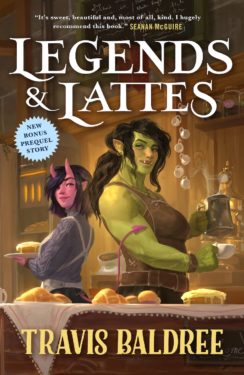 Legends & Lattes by Travis Baldree
Legends & Lattes by Travis Baldree
After a lifetime of bounties and bloodshed, Viv is hanging up her sword for the last time. The battle-weary orc aims to start fresh, opening the first ever coffee shop in the city of Thune. But old and new rivals stand in the way of success — not to mention the fact that no one has the faintest idea what coffee actually is. If Viv wants to put the blade behind her and make her plans a reality, she won’t be able to go it alone. But the true rewards of the uncharted path are the travelers you meet along the way. And whether drawn together by ancient magic, flaky pastry, or a freshly brewed cup, they may become partners, family, and something deeper than she ever could have dreamed.
opens in a new window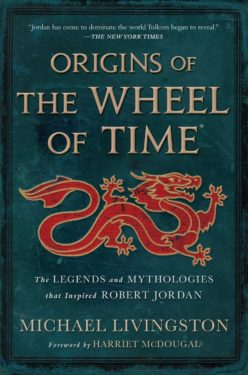 Origins of the Wheel of Time by Michael Livingston; foreword by Harriet McDougal
Origins of the Wheel of Time by Michael Livingston; foreword by Harriet McDougal
Take a deep dive into the real-world history and mythology that inspired the world of The Wheel of Time®. Origins of The Wheel of Time is written by Michael Livingston, Secretary-General of the United States Commission on Military History and professor of medieval literature at The Citadel, with a Foreword by Harriet McDougal, Robert Jordan’s editor, widow, and executor of his estate. Origins of The Wheel of Time will provide knowledge and insights to new and longtime fans looking to expand their understanding of the series or unearth the real-life influences that Jordan utilized in his world building.
opens in a new window Blood Moon by Heather Graham and Jon Land
Blood Moon by Heather Graham and Jon Land
They may have managed to win a major battle against the powerful enemy determined to destroy civilization as we know it. But the war continues, with Alex and Sam embarking on a desperate journey to save mankind, even as their friendship blossoms into something much more. The roadmap for their journey lies in a mysterious book, the language of which has never been deciphered, until Alex finds himself able to translate the words that may hold the keys to saving the future. But an ageless foe, long the guardian of the secrets his race has left behind on Earth, arises to stop them at all costs. At his disposal is a merciless army that has been awaiting this very war, an army as unstoppable as it is relentless.
opens in a new window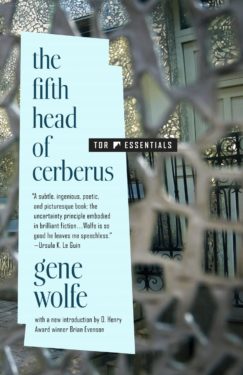 The Fifth Head of Cerberus by Gene Wolfe
The Fifth Head of Cerberus by Gene Wolfe
Far from Earth, two sister planets, Saint Anne and Saint Croix, circle each other in an eternal dance. It is said a race of shapeshifters once lived here, only to perish when men came. But one man believes they can still be found, somewhere in back of the beyond. In The Fifth Head of Cerberus, Gene Wolfe skillfully interweaves three bizarre tales to create a mesmerizing pattern: the harrowing account of the son of a mad genius who discovers his hideous heritage; a young man’s mythic dreamquest for his darker half; and the bizarre chronicle of a scientist’s nightmarish imprisonment. With a new introduction by O. Henry Award winning author Brian Evenson
November 15
opens in a new window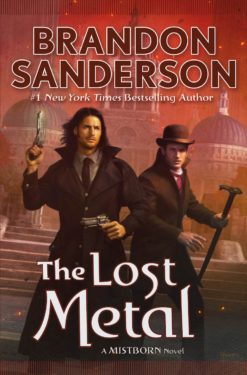 The Lost Metal by Brandon Sanderson
The Lost Metal by Brandon Sanderson
For years, frontier lawman turned big-city senator Waxillium Ladrian has hunted the shadowy organization the Set since they started kidnapping people with the power of Allomancy in their bloodlines. When Detective Marasi Colms and her partner Wayne find stockpiled weapons bound for the Outer City of Bilming, this opens a new lead. After Wax discovers a new type of explosive that can unleash unprecedented destruction, an immortal kandra serving Scadrial’s god, Harmony, reveals that Bilming has fallen under the influence of another god: Trell, worshipped by the Set. And Trell isn’t the only factor at play from the larger Cosmere—Marasi is recruited by offworlders with strange abilities who claim their goal is to protect Scadrial…at any cost.
November 29
opens in a new window Alone With You in the Ether by Olivie Blake
Alone With You in the Ether by Olivie Blake
Two people meet in the Art Institute by chance. Prior to their encounter, he is a doctoral student who manages his destructive thoughts with compulsive calculations about time travel; she is a bipolar counterfeit artist, undergoing court-ordered psychotherapy. By the end of the story, these things will still be true. But this is not a story about endings. For Regan, people are predictable and tedious, including and perhaps especially herself. To Aldo, the world feels disturbingly chaotic. For Regan and Aldo, life has been a matter of resigning themselves to the blueprints of inevitability—until the two meet. Could six conversations with a stranger be the variable that shakes up the entire simulation?


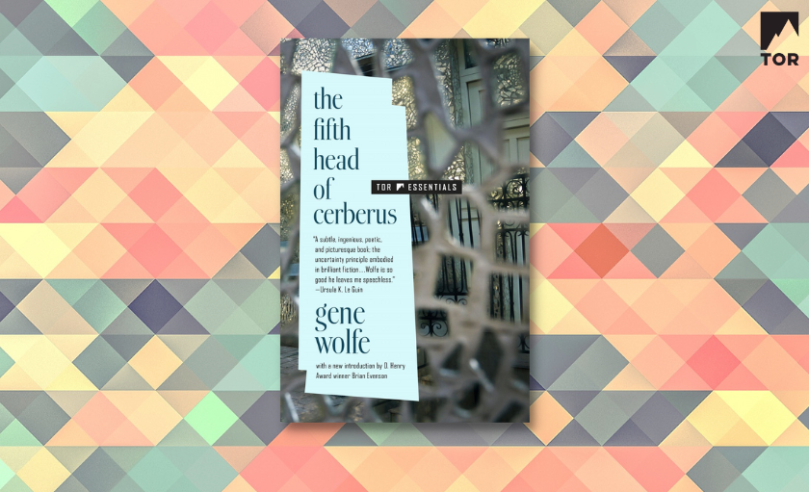





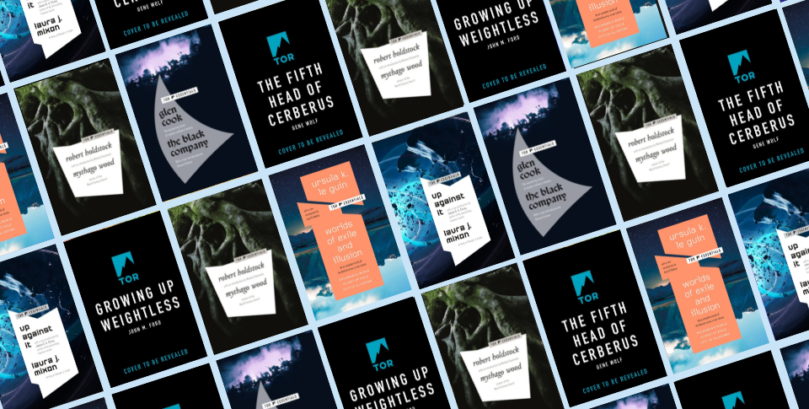
 The Black Company
The Black Company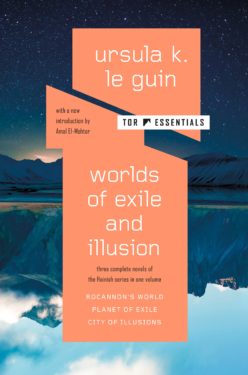 Worlds of Exile and Illusion
Worlds of Exile and Illusion Up Against It
Up Against It Mythago Wood
Mythago Wood Growing Up Weightless
Growing Up Weightless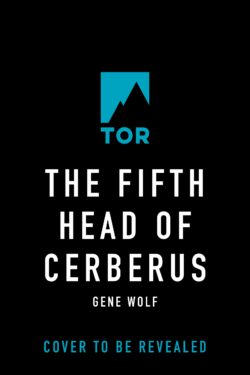 The Fifth Head of Cerberus
The Fifth Head of Cerberus